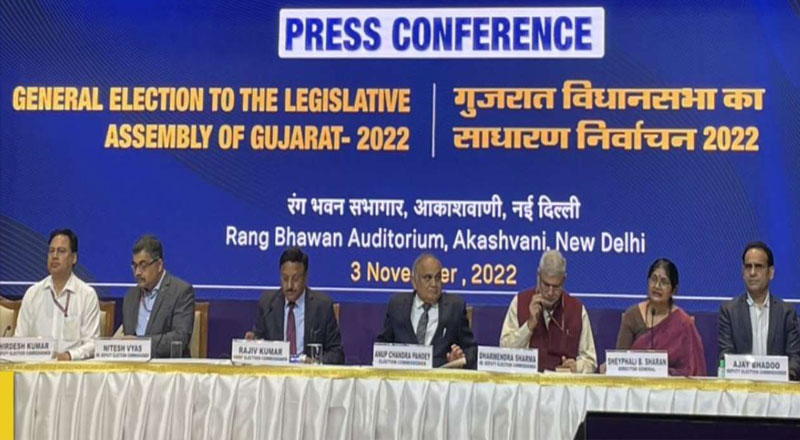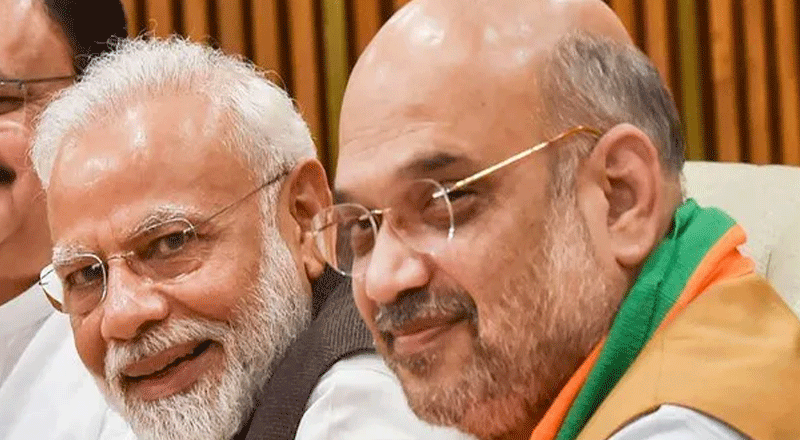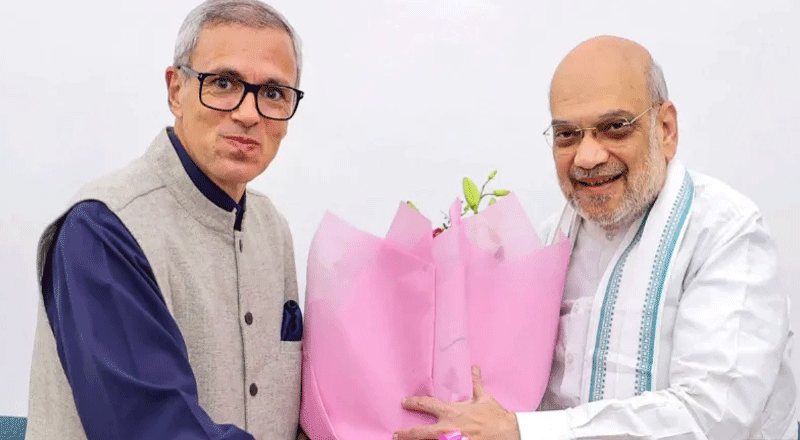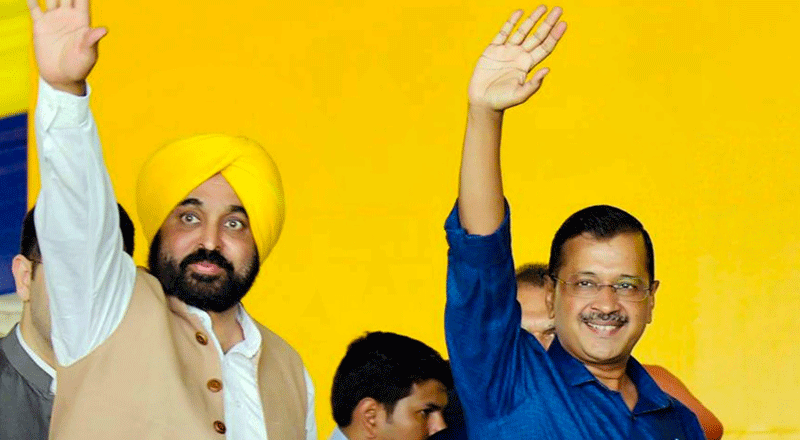The assembly elections in Gujarat will be conducted on December 1 and 5, which will see roughly 4.9 million people across 182 constituencies voting in two phases, the election commission announced on Thursday. The votes will be counted on December 8, the same day as Himachal Pradesh.
The Bharatiya Janata Party will be looking for its seventh consecutive assembly poll victory in what is a prestige fight for the ruling party in Prime Minister Narendra Modi’s home state. The Congress will hope to replicate its strong performance in 2017. The new entrant is the Aam Aadmi Party (AAP), which is banking on its governance record and delivery of amenities in Delhi to spring a surprise.
“There are 100 days left for the assembly in Gujarat to conclude,” said chief election commissioner Rajiv Kumar. “There are 4.9 crore electors across 182 constituencies.” Of these constituencies, 142 are general, 13 are reserved for Scheduled Castes and 27 for Scheduled Tribes, according to a press note released by ECI.
In the first phase, 89 constituencies in the western and southern parts of the state — the Kutch and Saurashtra regions, along with south Gujarat — will go to the polls. The Congress outperformed the BJP in these regions in the last assembly elections but may find it tough to hold on to its gains. In the second phase, 93 constituencies concentrated in north and central Gujarat — a BJP stronghold — will vote.
“There is a gap of 40 days between the end of the assemblies of the two states (Himachal Pradesh and Gujarat). According to the rules, it should be at least 30 days so that one result doesn’t impact the other…It is a combination of multiple factors and we are well within the factors of consideration, including polls in nearby states,” the chief election commissioner said.
“We also had to take note of the tragedy that had befallen the state. That was also one factor for the delay. There was state mourning in the state till yesterday (Wednesday). So, it is [because of] multiple factors,” he said.
The BJP has deep roots in Gujarat and has ruled it for the last 24 years. In the last election in 2017, the Congress however posted its best results in a generation on the back of widespread dissatisfaction among farmers and small businessmen and angry protests by the Patidar community over demands for reservation. The BJP won 99 seats while the Congress 77. This time, though, the contest is three-cornered due to the AAP’s high-decibel campaign led by Delhi chief minister Arvind Kejriwal.
There will be 51,782 polling stations set up and live webcasting of the process will be done in half of them. For 3,481 voters from the Siddi community (an ethnic group who trace their ancestry to the Bantu people in southeast Africa), the commission has set up three special polling stations. Postal ballots will be available to people who are above 80, are disabled or suffering from Covid and the process will be videographed.
“From Jan 1, 2022, to October 22, 3,24,420 new voters shall be able to cast votes because of the four qualifying dates notified for registration of electors,” Kumar said. “We will take special steps to ensure that they can vote.”
“Actions and outcomes speak larger than words. In a large number of assembly elections, results have shown, at times, those who were critical of the commission have got surprising results. I do not want to go into the details,” he said, in an apparent reference to some leaders blaming electronic voting machines after polls.
The BJP will bank on the popularity of Modi and home minister Amit Shah, and the government’s development record. The ruling party expressed confidence about winning the upcoming elections. Gujarat Chief Minister Bhupendra Patel said his party would once again retain power in the state.
“Election Commission has announced dates of Gujarat polls. New voters and the people of state will bless BJP’s politics of development and visionary leadership. I am of the firm belief that once again lotus will bloom in Gujarat,” Patel tweeted.
With little anger among farmers and traders, and the Patidar agitation largely extinguished, the Congress campaign has been lukewarm with no pan-state leader to take on chief minister Bhupendra Patel or match the popularity of Modi and Shah. The party has also suffered the exit of key leaders from the backward and Patidar communities. Congress always receives around 38% of the vote, which crossed 40% in 2017, from the rural regions and will bank on this stable vote base this time too. It promises subsidized amenities and loan waivers that will help it retain its tag as the main opposition party in the state.
“Seven crore brothers and sisters of Gujarat think that Congress is the only alternative for change in the state,” Congress party president Mallikarjun Kharge tweeted.
For the AAP, any success in its maiden outing will be considered impressive. The party has mounted a high-octane campaign on its promise of improving basic services such as health care and education and showcased its governance model in Delhi. The party is not only targeting urban centres that traditionally lean to the BJP (the party did well in Surat civic polls last year) but also rural seats dominated by Patidars in Saurashtra, which backed the Congress the last time.
Delhi CM Arvind Kejriwal, who has been paying visits to Gujarat every week as part of the AAP’s campaign, is hopeful of a change of guard in Gujarat.
“People of Gujarat are ready for a big change. We will definitely win,” the AAP national convener said in a tweet.





